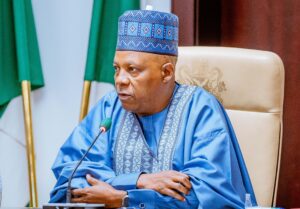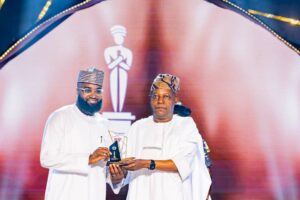BOI, NILEST, others meet to expand Nigeria leather market amidst Pomo ban
By Omolola Dede Adeyanju
Nigeria leather Industry is set to get bigger as Industry experts converged to discuss synergy, strategies for strengthening the value chain pipeline and achieve expansion scales for the leather market in Nigeria. This took effect at the three-day Lagos Leather Fair themed: ‘Staying Ahead,’ which was successfully concluded yesterday in a bid to create a platform for the industry’s extension.
The Group Head, Agro processing, Bank of Industry (BOI), Hadiza Tukur-shuaib in a panel session of Industry builders, expressed the bank’s concern for the Nigerian economy in respect to every industry, stating the bank’s functions on not only financing businesses to scale through but also occasioning opportunities for businesses to thrive.
She explained, “Considering the challenges and rigour of securing loans from Commercial banks, BOI is partnering over 300 service providers in order to ensure loans are easily accessible for business. The partnership is subsidised to reduce cost and gives tailored solutions to individual needs, equipment financing, funding and market access. BOI will also support customers to participate in different aspects of trade.”
As regards the leather market, Hadiza enumerated that there should be policies to monitor and limit the exportation of leather in order to make it affordable and available for manufacturers as well as end users.
“There should be synergy among producers of raw materials, finished leather works and exporters to enhance a solid value chain,” she said, noting the relevance of LLF as a platform to showcase leather products and create expected partnership for the Industry’s expansion.
According to the Founder Lagos Leather Fair (LLF), Creative Director, ‘FemiHandbags,’ Femi Olayebi, “Since its inception in 2017, LLF has brought together, established designers to emerging talent, as well as Industry builders. LLF 2023 is a melting pot of creativity, where traditional techniques intertwined with contemporary design Made-in-Nigeria and by extension, Made-in-Africa break the rules and shatter expectations. This year’s event featured an exclusive masterclass to pitching sessions and solo runway shows. Also featured were interactive workshops and informative panel discussions with Industry experts.”
Meanwhile, the DG/CEO Nigeria Institute of Leather and Science Technology (NILEST), Zaria, Prof. M.K Yakubu represented by Director Academy and Planning, NILEST, Dr Jerry Tagang submitted, “We are endowed with talents but we have to harness our talents to make competitive products. Training and research is sacrosanct for us in the leather Industry to compete in AFCFTA.
“Government is trying to develop common facility Centre for smart Footwear and give manufacturers access to raw materials, one is in Abba and another in Kano. The government have a big role to ensure facilities are available to grow businesses. There are established agencies for protection of brands/ copy offices called NOTAB giving intellectual right to people coming up with ideas or products. GET Intellectual Property (IP) protection for the protection of your ideas first.
“We are coming up with guidelines on how to standardise your products we work in conjunction with Standard Organization of Nigeria (SON) to give standards to leather shoes. We will have one standard and certificate that can be tendered anywhere in West Africa for your products. We are also coming up with second hand shoe Standard proposal.”
In his view, multi-award winning, CEO/Founder of Fashions Finest Africa, Sola Oyebade also known as Mr Mahogany said the quality of Nigeria’s leather products are improving greatly.
“Nigerian leathers are among the best in the world.” Citing a solution for expansion of the Industry, he revealed, “Collaboration is the key and it is a black man’s problem, makers of leather collaborating with producers of leather products with associations can aid in expansion.”
Divisional Head, Corporate banking, Providus Bank, Dr. Jones Olufunke said creating awareness of Nigeria leather is imperative.
“Let’s document our vision and make a case for what we want to see. There should be incentives and skills development. A start doesn’t necessarily have to be slow. With industry financiers, there can be shared costs to reduce cost and make our products affordable for Nigerians. For Exportation, market access improvement, this is where consultants come in to help you create a market majorly online, they help you upscale your skills and make you fit for the market space. Let us dare to use the tech advantage.”
Senior Economist, Nigerian Economic Summit Group, Wilson Erumebor, examined the Industry’s research challenges.
“There are success stories in music, art, in Nigeria. Our approach is why we aren’t getting results we want. Also basically, infrastructure, power supply and skills development, not creating innovative products for the market are some other challenges. We are not paying enough attention to export opportunities for refined leather and investment in skill development at the local level. How many people can access the subsidised loans? And commercial banks request you pay 30 percent interest on loans.”
The Director, Business Innovation Accelerator (BIA), Associate Professor of Entrepreneurship, Lagos Business School, Dr Henrietta Onwuegbuzie, in view of leather associations in Nigeria, maintained that there should be rewards for leather association members and inclusion of youths to the management team. She advised to create a transparent platform for how funds or finances are used and a change in the communication styles, thereby giving more visibility to the associations online in order to get more youth inclusion.




